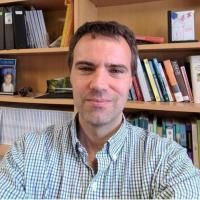Antibiotic-induced changes in the microbiota disrupt redox dynamics in the gut.
Date
2018-06-19
Journal Title
Journal ISSN
Volume Title
Repository Usage Stats
views
downloads
Citation Stats
Attention Stats
Abstract
How host and microbial factors combine to structure gut microbial communities remains incompletely understood. Redox potential is an important environmental feature affected by both host and microbial actions. We assessed how antibiotics, which can impact host and microbial function, change redox state and how this contributes to post-antibiotic succession. We showed gut redox potential increased within hours of an antibiotic dose in mice. Host and microbial functioning changed under treatment, but shifts in redox potentials could be attributed specifically to bacterial suppression in a host-free ex vivo human gut microbiota model. Redox dynamics were linked to blooms of the bacterial family Enterobacteriaceae. Ecological succession to pre-treatment composition was associated with recovery of gut redox, but also required dispersal from unaffected gut communities. As bacterial competition for electron acceptors can be a key ecological factor structuring gut communities, these results support the potential for manipulating gut microbiota through managing bacterial respiration.
Type
Department
Description
Provenance
Citation
Permalink
Published Version (Please cite this version)
Publication Info
Reese, Aspen T, Eugenia H Cho, Bruce Klitzman, Scott P Nichols, Natalie A Wisniewski, Max M Villa, Heather K Durand, Sharon Jiang, et al. (2018). Antibiotic-induced changes in the microbiota disrupt redox dynamics in the gut. eLife, 7. 10.7554/elife.35987 Retrieved from https://hdl.handle.net/10161/17198.
This is constructed from limited available data and may be imprecise. To cite this article, please review & use the official citation provided by the journal.
Collections
Scholars@Duke

Bruce Klitzman
Our overriding interests are in the fields of tissue engineering, wound healing, biosensors, and long term improvement of medical device implantation. My basic research interests are in the area of physiological mechanisms of optimizing substrate transport to tissue. This broad topic covers studies on a whole animal, whole organ, hemorheological, microvascular, cellular, ultrastructural, and molecular level. The current projects include:
1) control of blood flow and flow distribution in the microcirculation,
2) the effects of long-term synthetic and biologic implants on substrate transport to tissues,
3) tissue engineering; combining isolated cells, especially adult stem cells, with biomaterials to form specialized composite structures for implantation, with particular emphasis on endothelial cell physiology and its alteration by isolation and seeding on biomaterials.
4) decreasing the thrombogenicity of synthetic blood vessels and other blood-contacting devices, and improving their overall performance and biocompatibility.
5) reducing tissue damage resulting from abnormal perfusion (e.g., relative ischemia, anoxia, etc.) and therapies which minimize ischemic damage.
6) biosensor function, particularly glucose sensors in normal and diabetics.
7) measurement of tissue blood flow and oxygenation as an indicator of tissue viability and functional potential.
8) development of biocompatible materials for soft tissue reconstruction or augmentation.
9) improving performance of glaucoma drainage devices by directing a more favorable foreign body reaction
10) wound healing; particularly internal healing around foreign materials and the effect and prevention of microbes around implanted devices.

Justin Prouty Wright
My research focuses on understanding the causes and consequences of patterns of biological diversity across the planet. I am particularly interested in two broad questions: 1)How does the modification of the environment by organisms affect community structure and ecosystem function? and 2) what aspects of biodiversity matter most in the regulation of ecosystem function? While much of my research has focused on wetland plant communities, I am willing to study any organism and work in any ecosystem to answer the questions that interest me. I have worked in systems ranging from tropical streams to desert shrublands. My research program combines observational and experimental approaches with modeling to develop and test hypotheses and build towards synthetic ecological theory.

Marc Deshusses
Dr. Deshusses' research interests are related to the design, analysis and application of remediation, waste to energy and decentralized sanitation processes. A current focus is on novel reactors and processes for air, water and solid wastes treatment. Applications include treatment of odors and air toxics, biogas production, and novel sanitation and treatment technologies. Research interests include bioenergy and waste to energy processes, biofilms, biomolecular techniques for monitoring microorganisms in complex environments, indoor air quality, advanced oxidation processes, nanosensors, and mathematical modeling of environmental processes.

Lawrence Anthony David
Unless otherwise indicated, scholarly articles published by Duke faculty members are made available here with a CC-BY-NC (Creative Commons Attribution Non-Commercial) license, as enabled by the Duke Open Access Policy. If you wish to use the materials in ways not already permitted under CC-BY-NC, please consult the copyright owner. Other materials are made available here through the author’s grant of a non-exclusive license to make their work openly accessible.
